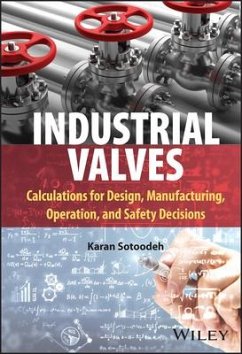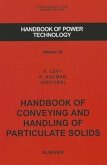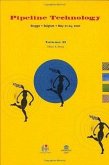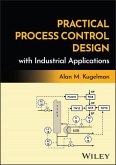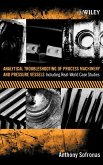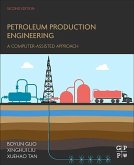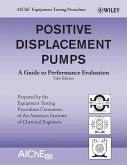Karan Sotoodeh
Industrial Valves
Calculations for Design, Manufacturing, Operation, and Safety Decisions
Karan Sotoodeh
Industrial Valves
Calculations for Design, Manufacturing, Operation, and Safety Decisions
- Gebundenes Buch
- Merkliste
- Auf die Merkliste
- Bewerten Bewerten
- Teilen
- Produkt teilen
- Produkterinnerung
- Produkterinnerung
Improve the design and safety of your industrial valves with this comprehensive guide Industrial valves are used to regulate the flow of liquids, gases, or slurries. They are fundamental to multiple industries, including marine shipping, in which valves regulate power supply, wastewater, water for fire-fighting, and other shipboard essentials. They are also critical to the oil and gas industry, where valves are used to control the flow of oil or gas out of deposits, direct the crude oil refining process, protect key areas and equipment from spillage and overflow, and more. Without the safety…mehr
Andere Kunden interessierten sich auch für
![Safety Valves in Oil and Gas Plants Safety Valves in Oil and Gas Plants]() Karan SotoodehSafety Valves in Oil and Gas Plants172,99 €
Karan SotoodehSafety Valves in Oil and Gas Plants172,99 €![Handbook of Conveying and Handling of Particulate Solids Handbook of Conveying and Handling of Particulate Solids]() A. Levy / H. Kalman (eds.)Handbook of Conveying and Handling of Particulate Solids416,99 €
A. Levy / H. Kalman (eds.)Handbook of Conveying and Handling of Particulate Solids416,99 €![Pipeline Technology Pipeline Technology]() R M DenysPipeline Technology534,99 €
R M DenysPipeline Technology534,99 €![Practical Process Control Design with Industrial Applications Practical Process Control Design with Industrial Applications]() Alan M KugelmanPractical Process Control Design with Industrial Applications193,99 €
Alan M KugelmanPractical Process Control Design with Industrial Applications193,99 €![Analytical Troubleshooting of Process Machinery and Pressure Vessels Analytical Troubleshooting of Process Machinery and Pressure Vessels]() Anthony SofronasAnalytical Troubleshooting of Process Machinery and Pressure Vessels157,99 €
Anthony SofronasAnalytical Troubleshooting of Process Machinery and Pressure Vessels157,99 €![Petroleum Production Engineering Petroleum Production Engineering]() Guo, PhD, BoyunPetroleum Production Engineering160,50 €
Guo, PhD, BoyunPetroleum Production Engineering160,50 €![Positive Displacement Pumps Positive Displacement Pumps]() AiCHEPositive Displacement Pumps80,99 €
AiCHEPositive Displacement Pumps80,99 €-
-
-
Improve the design and safety of your industrial valves with this comprehensive guide Industrial valves are used to regulate the flow of liquids, gases, or slurries. They are fundamental to multiple industries, including marine shipping, in which valves regulate power supply, wastewater, water for fire-fighting, and other shipboard essentials. They are also critical to the oil and gas industry, where valves are used to control the flow of oil or gas out of deposits, direct the crude oil refining process, protect key areas and equipment from spillage and overflow, and more. Without the safety and regulating power provided by industrial valves these industries could not proceed. This book provides a thorough introduction to the modeling and calculation of key challenges related to valve design, manufacturing, and operation. It focuses particularly on solving problems of material failure due to corrosion and cavitation, allowing readers to construct valve designs that will maximize safety and reliability. It is a critical resource in helping protect workplaces, industrial sites, and valuable equipment from the externalities of these fundamental industrial resources. Readers will also find: * Applied calculations based on real-life cases from industry * Information based on international standards including NORSOK (Norwegian standard) and IECs (European standards) * Based on decades of experience in the relevant industries Industrial Valves is a useful reference for engineers and practitioners in the oil and gas and marine industries, piping engineers, valve manufacturers, and more.
Hinweis: Dieser Artikel kann nur an eine deutsche Lieferadresse ausgeliefert werden.
Hinweis: Dieser Artikel kann nur an eine deutsche Lieferadresse ausgeliefert werden.
Produktdetails
- Produktdetails
- Verlag: Wiley
- Seitenzahl: 432
- Erscheinungstermin: 27. Juni 2023
- Englisch
- Abmessung: 229mm x 152mm x 24mm
- Gewicht: 744g
- ISBN-13: 9781394185023
- ISBN-10: 1394185022
- Artikelnr.: 66874119
- Herstellerkennzeichnung
- Libri GmbH
- Europaallee 1
- 36244 Bad Hersfeld
- gpsr@libri.de
- Verlag: Wiley
- Seitenzahl: 432
- Erscheinungstermin: 27. Juni 2023
- Englisch
- Abmessung: 229mm x 152mm x 24mm
- Gewicht: 744g
- ISBN-13: 9781394185023
- ISBN-10: 1394185022
- Artikelnr.: 66874119
- Herstellerkennzeichnung
- Libri GmbH
- Europaallee 1
- 36244 Bad Hersfeld
- gpsr@libri.de
Karan Sotoodeh, PhD, is an Iranian author and consulting engineer, previously employed by Baker Hughes as a senior valve and actuator engineer in the subsea oil and gas industry. He has nearly two decades of experience in this industry, and has published extensively on valves, piping, actuators, and related subjects. He has lectured on valves and piping in North America, Europe, and Asia.
1 Flow Capacity 1
1.1 Introduction 1
1.2 Flow Coefficient Chart and Flow Curve 8
1.3 Rangeability and Turndown 12
1.4 Valve Authority 14
1.5 Valve Gain 15
Questions and Answers 16
Further Reading 20
2 Valve Sizing 22
2.1 Introduction 22
2.2 Isolation Valve Sizing 22
2.3 Nonreturn (Check) Valve Sizing 26
2.4 Control Valve Sizing 34
2.4.1 Control Valve Sizing for Liquids 34
2.4.1.1 Specify the Variables Required to Size the Valve 35
2.4.1.2 Determine the Equation Constant (N) 37
2.4.1.3 Determine Piping Geometry Factor (FP) 37
2.4.1.4 Determine the Maximum Flow Rate (qmax) and Maximum Pressure Drop (¿
Pmax) 39
2.4.1.5 Solve for Flow Coefficient 44
2.4.1.6 Select the Correct Valve Size 44
2.4.2 Control Valve Sizing for Gas and Steam 47
2.4.2.1 Specify the Variables Required to Size the Valve 47
2.4.2.2 Determine the Equation Constant (N) 48
2.4.2.3 Determine Piping Geometry Factor (FP) 48
2.4.2.4 Determine the Expansion Factor (Y) 48
2.4.2.5 Solve for the Required Flow Coefficient (Cv) 50
2.5 Safety Relief Valve Sizing 56
2.5.1 Sizing for Gas or Vapor Relief 59
2.5.1.1 Critical Flow 59
2.5.1.2 Subcritical Flow 73
2.5.2 Sizing for Steam Relief 75
2.5.3 Sizing for Liquid Relief 79
2.5.3.1 Sizing for Liquid Relief with Capacity Certification 79
2.5.3.2 Sizing for Liquid Relief Without Capacity Certification 84
2.5.4 Sizing for Two-Phase Liquid/Vapor Relief 85
2.5.4.1 Sizing for Saturated Liquid and Saturated Vapor, Liquid Flashes 88
2.5.4.2 Sizing for Subcooled at the Pressure Relief Valve Inlet 91
2.5.5 Sizing for Fire Case and Hydraulic Expansion 93
2.5.5.1 Hydraulic Expansion (Thermal Expansion) 95
2.5.5.2 Sizing Safety Valve for the Fire Case 96
Questions and Answers 103
Further Reading 110
3 Cavitation and Flashing 112
3.1 Introduction 112
3.2 Cavitation 112
3.2.1 What is Cavitation? 112
3.2.2 Cavitation Essential Parameters 113
3.2.3 Cavitation Analysis 115
3.3 Flashing 116
Questions and Answers 118
Further Reading 123
4 Wall Thickness 125
4.1 Introduction 125
4.2 ASME B16.34 Minimum Wall Thickness Calculation 125
4.2.1 Conservation Approach (Mandatory Appendix A) 125
4.2.2 Nonconservation Method 129
4.2.3 ASME Sec. VIII Div. 02 Wall Thickness Calculation 134
4.3 Wafer Design Thickness Validation 136
Questions and Answers 142
Further Reading 147
5 Material and Corrosion 149
5.1 Introduction 149
5.2 Carbon Dioxide Corrosion 150
5.2.1 Corrosion Mechanism 150
5.2.2 Corrosion Mitigation 151
5.2.3 Corrosion Rate Calculation 152
5.2.3.1 Basic CO2 Corrosion Rate 152
5.2.3.2 Corrective CO2 Corrosion Rate 154
5.2.3.3 Final CO2 Corrosion Rate 161
5.3 Pitting Corrosion 162
5.4 Carbon Equivalent 165
5.5 Hydrogen-Induced Stress Cracking (HISC) Corrosion 167
5.5.1 HISC and Vulnerable Materials 168
5.5.2 HISC and Stress 168
5.5.3 HISC and Cathodic Protection 168
5.5.4 HISC and DNV Standard 169
Questions and Answers 177
Further Reading 184
6 Noise 185
6.1 Introduction to Sound 185
6.2 Introduction to Noise 186
6.3 Noise in Industrial Valves 189
6.3.1 Mechanical Noise and Vibration 190
6.3.2 Fluid Noise 190
6.3.2.1 Aerodynamic Noise 191
6.3.2.2 Hydrodynamic Noise 191
6.3.3 Noise Control Strategies 191
6.4 Noise Calculations for Pipes and Valves 192
6.4.1 Acoustic Fatigue Analysis 192
6.4.1.1 Sound Power Level Calculations 193
6.4.1.2 Mach Number 198
6.4.2 Noise in Control Valves 203
6.4.2.1 Aerodynamic Noise in Control Valves 203
6.4.2.2 Hydrodynamic Noise in Control Valves 208
6.4.3 Noise in Pressure Safety or Relief Valves 215
6.4.3.1 Calculation of Noise Emission According to ISO 4126-9 216
6.4.3.2 Calculation of Noise Emission According to API 521 218
6.4.3.3 Calculation of Noise Emission According to VDI 2713 221
Questions and Answers 222
Further Reading 231
7 Water Hammering 233
7.1 Introduction 233
7.2 Water Hammering and Pressure Loss in Check Valves 233
7.3 Water Hammering Calculations 243
Questions and Answers 249
Further Reading 256
8 Safety Valves 258
8.1 Introduction 258
8.2 Safety Valve Parts 259
8.3 Safety Valve Design and Operation 259
8.3.1 Design and Operation Parameters 259
8.3.1.1 Overpressure Criteria 277
8.3.2 Principle of Operation 278
8.3.3 Safety Valve Reaction Forces 282
8.3.4 Safety Valve Capacity Conversion 294
Questions and Answers 296
Further Reading 302
9 Safety and Reliability 304
9.1 Introduction 304
9.2 Safety Standards 305
9.3 Risk Analysis 308
9.4 Basic Safety and Reliability Concepts 312
9.4.1 System Incidents and Failures 312
9.4.1.1 Failure Rate 313
9.4.1.2 Repair Rate 317
9.4.1.3 Mean Time to Failure (MTTF) 317
9.4.1.4 Mean Time Between Failure (MTBF) 318
9.4.1.5 Mean Time to Repair and Recovery (MTTR) 319
9.4.1.6 Mean Time to Detection (MTTD) 319
9.4.2 Reliability and Unreliability 319
9.4.3 Availability and Unavailability 331
9.5 Safety Integrity Level (SIL) Calculations 336
9.5.1 SIL 336
9.5.2 Probability of Failure on Demand (PFD) 338
9.5.3 Mean Downtime 339
9.5.4 Diagnostic Coverage 342
9.5.5 Safe Failure Fraction (SFF) 342
9.6 Condition Monitoring (ValveWatch) 347
Questions and Answers 348
Further Reading 354
10 Valve Operation 357
10.1 Introduction 357
10.2 Valve Torque 358
10.3 Stem Design 363
10.3.1 MAST Calculations 363
10.3.2 Buckling Prevention 369
10.3.3 Torsional Deflection Prevention 374
10.3.4 MAST Limitation for Quarter-Turn Cryogenic Valves 376
Questions and Answers 378
Further Reading 384
11 Miscellaneous 385
11.1 Introduction 385
11.2 Joint Efficiency 386
11.2.1 Weld Joint Efficiency 386
11.2.2 Bolted Joint Efficiency 388
11.2.2.1 Bolted Bonnet or Cover Joints 388
11.2.2.2 Bolted Body Joints 392
11.2.3 Threaded Joint Efficiency 394
11.2.3.1 Threaded Bonnet or Cover Joints 394
11.2.3.2 Threaded Body Joints 395
11.3 Stem Sealing 395
Questions and Answers 399
Further Reading 405
Index 407
1.1 Introduction 1
1.2 Flow Coefficient Chart and Flow Curve 8
1.3 Rangeability and Turndown 12
1.4 Valve Authority 14
1.5 Valve Gain 15
Questions and Answers 16
Further Reading 20
2 Valve Sizing 22
2.1 Introduction 22
2.2 Isolation Valve Sizing 22
2.3 Nonreturn (Check) Valve Sizing 26
2.4 Control Valve Sizing 34
2.4.1 Control Valve Sizing for Liquids 34
2.4.1.1 Specify the Variables Required to Size the Valve 35
2.4.1.2 Determine the Equation Constant (N) 37
2.4.1.3 Determine Piping Geometry Factor (FP) 37
2.4.1.4 Determine the Maximum Flow Rate (qmax) and Maximum Pressure Drop (¿
Pmax) 39
2.4.1.5 Solve for Flow Coefficient 44
2.4.1.6 Select the Correct Valve Size 44
2.4.2 Control Valve Sizing for Gas and Steam 47
2.4.2.1 Specify the Variables Required to Size the Valve 47
2.4.2.2 Determine the Equation Constant (N) 48
2.4.2.3 Determine Piping Geometry Factor (FP) 48
2.4.2.4 Determine the Expansion Factor (Y) 48
2.4.2.5 Solve for the Required Flow Coefficient (Cv) 50
2.5 Safety Relief Valve Sizing 56
2.5.1 Sizing for Gas or Vapor Relief 59
2.5.1.1 Critical Flow 59
2.5.1.2 Subcritical Flow 73
2.5.2 Sizing for Steam Relief 75
2.5.3 Sizing for Liquid Relief 79
2.5.3.1 Sizing for Liquid Relief with Capacity Certification 79
2.5.3.2 Sizing for Liquid Relief Without Capacity Certification 84
2.5.4 Sizing for Two-Phase Liquid/Vapor Relief 85
2.5.4.1 Sizing for Saturated Liquid and Saturated Vapor, Liquid Flashes 88
2.5.4.2 Sizing for Subcooled at the Pressure Relief Valve Inlet 91
2.5.5 Sizing for Fire Case and Hydraulic Expansion 93
2.5.5.1 Hydraulic Expansion (Thermal Expansion) 95
2.5.5.2 Sizing Safety Valve for the Fire Case 96
Questions and Answers 103
Further Reading 110
3 Cavitation and Flashing 112
3.1 Introduction 112
3.2 Cavitation 112
3.2.1 What is Cavitation? 112
3.2.2 Cavitation Essential Parameters 113
3.2.3 Cavitation Analysis 115
3.3 Flashing 116
Questions and Answers 118
Further Reading 123
4 Wall Thickness 125
4.1 Introduction 125
4.2 ASME B16.34 Minimum Wall Thickness Calculation 125
4.2.1 Conservation Approach (Mandatory Appendix A) 125
4.2.2 Nonconservation Method 129
4.2.3 ASME Sec. VIII Div. 02 Wall Thickness Calculation 134
4.3 Wafer Design Thickness Validation 136
Questions and Answers 142
Further Reading 147
5 Material and Corrosion 149
5.1 Introduction 149
5.2 Carbon Dioxide Corrosion 150
5.2.1 Corrosion Mechanism 150
5.2.2 Corrosion Mitigation 151
5.2.3 Corrosion Rate Calculation 152
5.2.3.1 Basic CO2 Corrosion Rate 152
5.2.3.2 Corrective CO2 Corrosion Rate 154
5.2.3.3 Final CO2 Corrosion Rate 161
5.3 Pitting Corrosion 162
5.4 Carbon Equivalent 165
5.5 Hydrogen-Induced Stress Cracking (HISC) Corrosion 167
5.5.1 HISC and Vulnerable Materials 168
5.5.2 HISC and Stress 168
5.5.3 HISC and Cathodic Protection 168
5.5.4 HISC and DNV Standard 169
Questions and Answers 177
Further Reading 184
6 Noise 185
6.1 Introduction to Sound 185
6.2 Introduction to Noise 186
6.3 Noise in Industrial Valves 189
6.3.1 Mechanical Noise and Vibration 190
6.3.2 Fluid Noise 190
6.3.2.1 Aerodynamic Noise 191
6.3.2.2 Hydrodynamic Noise 191
6.3.3 Noise Control Strategies 191
6.4 Noise Calculations for Pipes and Valves 192
6.4.1 Acoustic Fatigue Analysis 192
6.4.1.1 Sound Power Level Calculations 193
6.4.1.2 Mach Number 198
6.4.2 Noise in Control Valves 203
6.4.2.1 Aerodynamic Noise in Control Valves 203
6.4.2.2 Hydrodynamic Noise in Control Valves 208
6.4.3 Noise in Pressure Safety or Relief Valves 215
6.4.3.1 Calculation of Noise Emission According to ISO 4126-9 216
6.4.3.2 Calculation of Noise Emission According to API 521 218
6.4.3.3 Calculation of Noise Emission According to VDI 2713 221
Questions and Answers 222
Further Reading 231
7 Water Hammering 233
7.1 Introduction 233
7.2 Water Hammering and Pressure Loss in Check Valves 233
7.3 Water Hammering Calculations 243
Questions and Answers 249
Further Reading 256
8 Safety Valves 258
8.1 Introduction 258
8.2 Safety Valve Parts 259
8.3 Safety Valve Design and Operation 259
8.3.1 Design and Operation Parameters 259
8.3.1.1 Overpressure Criteria 277
8.3.2 Principle of Operation 278
8.3.3 Safety Valve Reaction Forces 282
8.3.4 Safety Valve Capacity Conversion 294
Questions and Answers 296
Further Reading 302
9 Safety and Reliability 304
9.1 Introduction 304
9.2 Safety Standards 305
9.3 Risk Analysis 308
9.4 Basic Safety and Reliability Concepts 312
9.4.1 System Incidents and Failures 312
9.4.1.1 Failure Rate 313
9.4.1.2 Repair Rate 317
9.4.1.3 Mean Time to Failure (MTTF) 317
9.4.1.4 Mean Time Between Failure (MTBF) 318
9.4.1.5 Mean Time to Repair and Recovery (MTTR) 319
9.4.1.6 Mean Time to Detection (MTTD) 319
9.4.2 Reliability and Unreliability 319
9.4.3 Availability and Unavailability 331
9.5 Safety Integrity Level (SIL) Calculations 336
9.5.1 SIL 336
9.5.2 Probability of Failure on Demand (PFD) 338
9.5.3 Mean Downtime 339
9.5.4 Diagnostic Coverage 342
9.5.5 Safe Failure Fraction (SFF) 342
9.6 Condition Monitoring (ValveWatch) 347
Questions and Answers 348
Further Reading 354
10 Valve Operation 357
10.1 Introduction 357
10.2 Valve Torque 358
10.3 Stem Design 363
10.3.1 MAST Calculations 363
10.3.2 Buckling Prevention 369
10.3.3 Torsional Deflection Prevention 374
10.3.4 MAST Limitation for Quarter-Turn Cryogenic Valves 376
Questions and Answers 378
Further Reading 384
11 Miscellaneous 385
11.1 Introduction 385
11.2 Joint Efficiency 386
11.2.1 Weld Joint Efficiency 386
11.2.2 Bolted Joint Efficiency 388
11.2.2.1 Bolted Bonnet or Cover Joints 388
11.2.2.2 Bolted Body Joints 392
11.2.3 Threaded Joint Efficiency 394
11.2.3.1 Threaded Bonnet or Cover Joints 394
11.2.3.2 Threaded Body Joints 395
11.3 Stem Sealing 395
Questions and Answers 399
Further Reading 405
Index 407
1 Flow Capacity 1
1.1 Introduction 1
1.2 Flow Coefficient Chart and Flow Curve 8
1.3 Rangeability and Turndown 12
1.4 Valve Authority 14
1.5 Valve Gain 15
Questions and Answers 16
Further Reading 20
2 Valve Sizing 22
2.1 Introduction 22
2.2 Isolation Valve Sizing 22
2.3 Nonreturn (Check) Valve Sizing 26
2.4 Control Valve Sizing 34
2.4.1 Control Valve Sizing for Liquids 34
2.4.1.1 Specify the Variables Required to Size the Valve 35
2.4.1.2 Determine the Equation Constant (N) 37
2.4.1.3 Determine Piping Geometry Factor (FP) 37
2.4.1.4 Determine the Maximum Flow Rate (qmax) and Maximum Pressure Drop (¿
Pmax) 39
2.4.1.5 Solve for Flow Coefficient 44
2.4.1.6 Select the Correct Valve Size 44
2.4.2 Control Valve Sizing for Gas and Steam 47
2.4.2.1 Specify the Variables Required to Size the Valve 47
2.4.2.2 Determine the Equation Constant (N) 48
2.4.2.3 Determine Piping Geometry Factor (FP) 48
2.4.2.4 Determine the Expansion Factor (Y) 48
2.4.2.5 Solve for the Required Flow Coefficient (Cv) 50
2.5 Safety Relief Valve Sizing 56
2.5.1 Sizing for Gas or Vapor Relief 59
2.5.1.1 Critical Flow 59
2.5.1.2 Subcritical Flow 73
2.5.2 Sizing for Steam Relief 75
2.5.3 Sizing for Liquid Relief 79
2.5.3.1 Sizing for Liquid Relief with Capacity Certification 79
2.5.3.2 Sizing for Liquid Relief Without Capacity Certification 84
2.5.4 Sizing for Two-Phase Liquid/Vapor Relief 85
2.5.4.1 Sizing for Saturated Liquid and Saturated Vapor, Liquid Flashes 88
2.5.4.2 Sizing for Subcooled at the Pressure Relief Valve Inlet 91
2.5.5 Sizing for Fire Case and Hydraulic Expansion 93
2.5.5.1 Hydraulic Expansion (Thermal Expansion) 95
2.5.5.2 Sizing Safety Valve for the Fire Case 96
Questions and Answers 103
Further Reading 110
3 Cavitation and Flashing 112
3.1 Introduction 112
3.2 Cavitation 112
3.2.1 What is Cavitation? 112
3.2.2 Cavitation Essential Parameters 113
3.2.3 Cavitation Analysis 115
3.3 Flashing 116
Questions and Answers 118
Further Reading 123
4 Wall Thickness 125
4.1 Introduction 125
4.2 ASME B16.34 Minimum Wall Thickness Calculation 125
4.2.1 Conservation Approach (Mandatory Appendix A) 125
4.2.2 Nonconservation Method 129
4.2.3 ASME Sec. VIII Div. 02 Wall Thickness Calculation 134
4.3 Wafer Design Thickness Validation 136
Questions and Answers 142
Further Reading 147
5 Material and Corrosion 149
5.1 Introduction 149
5.2 Carbon Dioxide Corrosion 150
5.2.1 Corrosion Mechanism 150
5.2.2 Corrosion Mitigation 151
5.2.3 Corrosion Rate Calculation 152
5.2.3.1 Basic CO2 Corrosion Rate 152
5.2.3.2 Corrective CO2 Corrosion Rate 154
5.2.3.3 Final CO2 Corrosion Rate 161
5.3 Pitting Corrosion 162
5.4 Carbon Equivalent 165
5.5 Hydrogen-Induced Stress Cracking (HISC) Corrosion 167
5.5.1 HISC and Vulnerable Materials 168
5.5.2 HISC and Stress 168
5.5.3 HISC and Cathodic Protection 168
5.5.4 HISC and DNV Standard 169
Questions and Answers 177
Further Reading 184
6 Noise 185
6.1 Introduction to Sound 185
6.2 Introduction to Noise 186
6.3 Noise in Industrial Valves 189
6.3.1 Mechanical Noise and Vibration 190
6.3.2 Fluid Noise 190
6.3.2.1 Aerodynamic Noise 191
6.3.2.2 Hydrodynamic Noise 191
6.3.3 Noise Control Strategies 191
6.4 Noise Calculations for Pipes and Valves 192
6.4.1 Acoustic Fatigue Analysis 192
6.4.1.1 Sound Power Level Calculations 193
6.4.1.2 Mach Number 198
6.4.2 Noise in Control Valves 203
6.4.2.1 Aerodynamic Noise in Control Valves 203
6.4.2.2 Hydrodynamic Noise in Control Valves 208
6.4.3 Noise in Pressure Safety or Relief Valves 215
6.4.3.1 Calculation of Noise Emission According to ISO 4126-9 216
6.4.3.2 Calculation of Noise Emission According to API 521 218
6.4.3.3 Calculation of Noise Emission According to VDI 2713 221
Questions and Answers 222
Further Reading 231
7 Water Hammering 233
7.1 Introduction 233
7.2 Water Hammering and Pressure Loss in Check Valves 233
7.3 Water Hammering Calculations 243
Questions and Answers 249
Further Reading 256
8 Safety Valves 258
8.1 Introduction 258
8.2 Safety Valve Parts 259
8.3 Safety Valve Design and Operation 259
8.3.1 Design and Operation Parameters 259
8.3.1.1 Overpressure Criteria 277
8.3.2 Principle of Operation 278
8.3.3 Safety Valve Reaction Forces 282
8.3.4 Safety Valve Capacity Conversion 294
Questions and Answers 296
Further Reading 302
9 Safety and Reliability 304
9.1 Introduction 304
9.2 Safety Standards 305
9.3 Risk Analysis 308
9.4 Basic Safety and Reliability Concepts 312
9.4.1 System Incidents and Failures 312
9.4.1.1 Failure Rate 313
9.4.1.2 Repair Rate 317
9.4.1.3 Mean Time to Failure (MTTF) 317
9.4.1.4 Mean Time Between Failure (MTBF) 318
9.4.1.5 Mean Time to Repair and Recovery (MTTR) 319
9.4.1.6 Mean Time to Detection (MTTD) 319
9.4.2 Reliability and Unreliability 319
9.4.3 Availability and Unavailability 331
9.5 Safety Integrity Level (SIL) Calculations 336
9.5.1 SIL 336
9.5.2 Probability of Failure on Demand (PFD) 338
9.5.3 Mean Downtime 339
9.5.4 Diagnostic Coverage 342
9.5.5 Safe Failure Fraction (SFF) 342
9.6 Condition Monitoring (ValveWatch) 347
Questions and Answers 348
Further Reading 354
10 Valve Operation 357
10.1 Introduction 357
10.2 Valve Torque 358
10.3 Stem Design 363
10.3.1 MAST Calculations 363
10.3.2 Buckling Prevention 369
10.3.3 Torsional Deflection Prevention 374
10.3.4 MAST Limitation for Quarter-Turn Cryogenic Valves 376
Questions and Answers 378
Further Reading 384
11 Miscellaneous 385
11.1 Introduction 385
11.2 Joint Efficiency 386
11.2.1 Weld Joint Efficiency 386
11.2.2 Bolted Joint Efficiency 388
11.2.2.1 Bolted Bonnet or Cover Joints 388
11.2.2.2 Bolted Body Joints 392
11.2.3 Threaded Joint Efficiency 394
11.2.3.1 Threaded Bonnet or Cover Joints 394
11.2.3.2 Threaded Body Joints 395
11.3 Stem Sealing 395
Questions and Answers 399
Further Reading 405
Index 407
1.1 Introduction 1
1.2 Flow Coefficient Chart and Flow Curve 8
1.3 Rangeability and Turndown 12
1.4 Valve Authority 14
1.5 Valve Gain 15
Questions and Answers 16
Further Reading 20
2 Valve Sizing 22
2.1 Introduction 22
2.2 Isolation Valve Sizing 22
2.3 Nonreturn (Check) Valve Sizing 26
2.4 Control Valve Sizing 34
2.4.1 Control Valve Sizing for Liquids 34
2.4.1.1 Specify the Variables Required to Size the Valve 35
2.4.1.2 Determine the Equation Constant (N) 37
2.4.1.3 Determine Piping Geometry Factor (FP) 37
2.4.1.4 Determine the Maximum Flow Rate (qmax) and Maximum Pressure Drop (¿
Pmax) 39
2.4.1.5 Solve for Flow Coefficient 44
2.4.1.6 Select the Correct Valve Size 44
2.4.2 Control Valve Sizing for Gas and Steam 47
2.4.2.1 Specify the Variables Required to Size the Valve 47
2.4.2.2 Determine the Equation Constant (N) 48
2.4.2.3 Determine Piping Geometry Factor (FP) 48
2.4.2.4 Determine the Expansion Factor (Y) 48
2.4.2.5 Solve for the Required Flow Coefficient (Cv) 50
2.5 Safety Relief Valve Sizing 56
2.5.1 Sizing for Gas or Vapor Relief 59
2.5.1.1 Critical Flow 59
2.5.1.2 Subcritical Flow 73
2.5.2 Sizing for Steam Relief 75
2.5.3 Sizing for Liquid Relief 79
2.5.3.1 Sizing for Liquid Relief with Capacity Certification 79
2.5.3.2 Sizing for Liquid Relief Without Capacity Certification 84
2.5.4 Sizing for Two-Phase Liquid/Vapor Relief 85
2.5.4.1 Sizing for Saturated Liquid and Saturated Vapor, Liquid Flashes 88
2.5.4.2 Sizing for Subcooled at the Pressure Relief Valve Inlet 91
2.5.5 Sizing for Fire Case and Hydraulic Expansion 93
2.5.5.1 Hydraulic Expansion (Thermal Expansion) 95
2.5.5.2 Sizing Safety Valve for the Fire Case 96
Questions and Answers 103
Further Reading 110
3 Cavitation and Flashing 112
3.1 Introduction 112
3.2 Cavitation 112
3.2.1 What is Cavitation? 112
3.2.2 Cavitation Essential Parameters 113
3.2.3 Cavitation Analysis 115
3.3 Flashing 116
Questions and Answers 118
Further Reading 123
4 Wall Thickness 125
4.1 Introduction 125
4.2 ASME B16.34 Minimum Wall Thickness Calculation 125
4.2.1 Conservation Approach (Mandatory Appendix A) 125
4.2.2 Nonconservation Method 129
4.2.3 ASME Sec. VIII Div. 02 Wall Thickness Calculation 134
4.3 Wafer Design Thickness Validation 136
Questions and Answers 142
Further Reading 147
5 Material and Corrosion 149
5.1 Introduction 149
5.2 Carbon Dioxide Corrosion 150
5.2.1 Corrosion Mechanism 150
5.2.2 Corrosion Mitigation 151
5.2.3 Corrosion Rate Calculation 152
5.2.3.1 Basic CO2 Corrosion Rate 152
5.2.3.2 Corrective CO2 Corrosion Rate 154
5.2.3.3 Final CO2 Corrosion Rate 161
5.3 Pitting Corrosion 162
5.4 Carbon Equivalent 165
5.5 Hydrogen-Induced Stress Cracking (HISC) Corrosion 167
5.5.1 HISC and Vulnerable Materials 168
5.5.2 HISC and Stress 168
5.5.3 HISC and Cathodic Protection 168
5.5.4 HISC and DNV Standard 169
Questions and Answers 177
Further Reading 184
6 Noise 185
6.1 Introduction to Sound 185
6.2 Introduction to Noise 186
6.3 Noise in Industrial Valves 189
6.3.1 Mechanical Noise and Vibration 190
6.3.2 Fluid Noise 190
6.3.2.1 Aerodynamic Noise 191
6.3.2.2 Hydrodynamic Noise 191
6.3.3 Noise Control Strategies 191
6.4 Noise Calculations for Pipes and Valves 192
6.4.1 Acoustic Fatigue Analysis 192
6.4.1.1 Sound Power Level Calculations 193
6.4.1.2 Mach Number 198
6.4.2 Noise in Control Valves 203
6.4.2.1 Aerodynamic Noise in Control Valves 203
6.4.2.2 Hydrodynamic Noise in Control Valves 208
6.4.3 Noise in Pressure Safety or Relief Valves 215
6.4.3.1 Calculation of Noise Emission According to ISO 4126-9 216
6.4.3.2 Calculation of Noise Emission According to API 521 218
6.4.3.3 Calculation of Noise Emission According to VDI 2713 221
Questions and Answers 222
Further Reading 231
7 Water Hammering 233
7.1 Introduction 233
7.2 Water Hammering and Pressure Loss in Check Valves 233
7.3 Water Hammering Calculations 243
Questions and Answers 249
Further Reading 256
8 Safety Valves 258
8.1 Introduction 258
8.2 Safety Valve Parts 259
8.3 Safety Valve Design and Operation 259
8.3.1 Design and Operation Parameters 259
8.3.1.1 Overpressure Criteria 277
8.3.2 Principle of Operation 278
8.3.3 Safety Valve Reaction Forces 282
8.3.4 Safety Valve Capacity Conversion 294
Questions and Answers 296
Further Reading 302
9 Safety and Reliability 304
9.1 Introduction 304
9.2 Safety Standards 305
9.3 Risk Analysis 308
9.4 Basic Safety and Reliability Concepts 312
9.4.1 System Incidents and Failures 312
9.4.1.1 Failure Rate 313
9.4.1.2 Repair Rate 317
9.4.1.3 Mean Time to Failure (MTTF) 317
9.4.1.4 Mean Time Between Failure (MTBF) 318
9.4.1.5 Mean Time to Repair and Recovery (MTTR) 319
9.4.1.6 Mean Time to Detection (MTTD) 319
9.4.2 Reliability and Unreliability 319
9.4.3 Availability and Unavailability 331
9.5 Safety Integrity Level (SIL) Calculations 336
9.5.1 SIL 336
9.5.2 Probability of Failure on Demand (PFD) 338
9.5.3 Mean Downtime 339
9.5.4 Diagnostic Coverage 342
9.5.5 Safe Failure Fraction (SFF) 342
9.6 Condition Monitoring (ValveWatch) 347
Questions and Answers 348
Further Reading 354
10 Valve Operation 357
10.1 Introduction 357
10.2 Valve Torque 358
10.3 Stem Design 363
10.3.1 MAST Calculations 363
10.3.2 Buckling Prevention 369
10.3.3 Torsional Deflection Prevention 374
10.3.4 MAST Limitation for Quarter-Turn Cryogenic Valves 376
Questions and Answers 378
Further Reading 384
11 Miscellaneous 385
11.1 Introduction 385
11.2 Joint Efficiency 386
11.2.1 Weld Joint Efficiency 386
11.2.2 Bolted Joint Efficiency 388
11.2.2.1 Bolted Bonnet or Cover Joints 388
11.2.2.2 Bolted Body Joints 392
11.2.3 Threaded Joint Efficiency 394
11.2.3.1 Threaded Bonnet or Cover Joints 394
11.2.3.2 Threaded Body Joints 395
11.3 Stem Sealing 395
Questions and Answers 399
Further Reading 405
Index 407

